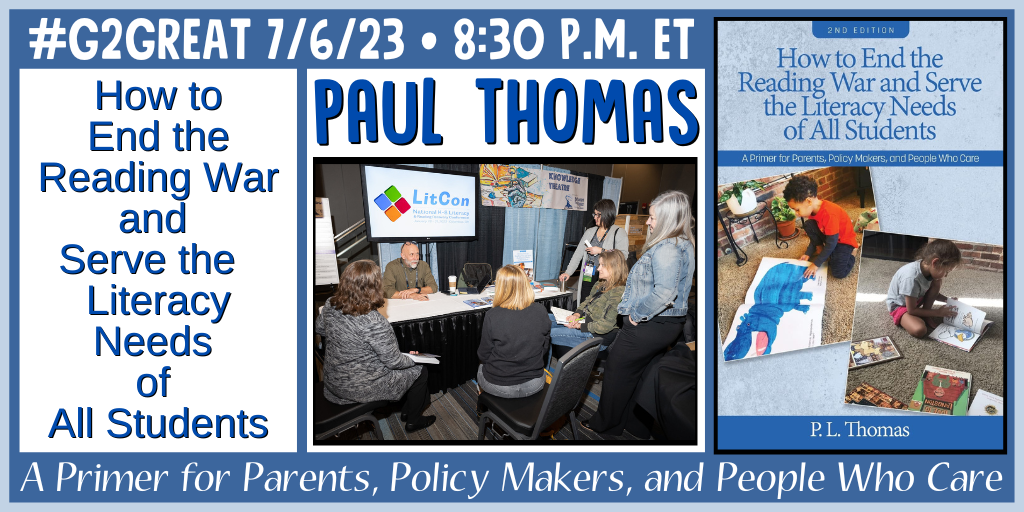
You can access the Wakelet for this chat HERE
Written by Mary Howard
On 7/6/23, we were honored to welcome #G2Great chat guest host, Paul Thomas to discuss his book, How to End the Reading War and Serve the Literacy Needs of All Students (2nd Edition): A Primer for Parents, Policy Makers, and People Who Care (2022, IAP Information Age Publishing). This was the first chat in a two-part BOOK PAIRING that continues next week with Patricia Paugh and Deborah MacPhee.
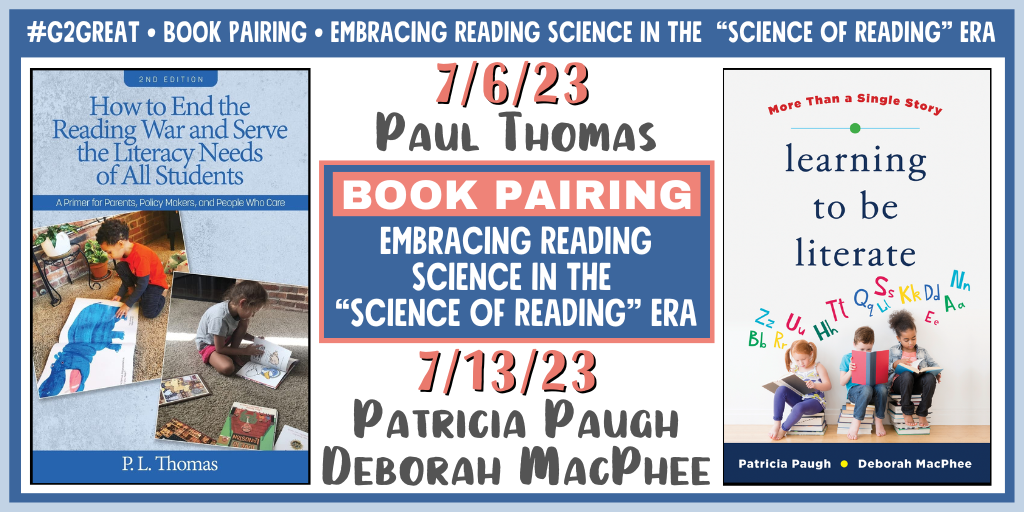
Dr. P.L. Thomas, EdD is a Professor of Education at Furman University, in Greenville SC. I’ve enthusiastically followed his work since “The Science of Reading” first appeared on the educational landscape. His blogs on the topic at Radical Scholarship are read widely and he is a much sought-after speaker at conferences, webinars and podcasts. I attended a wonderful recent Zoom podcast with principal Matt Renwick: The Science of Reading Movement and the Never-Ending Debate: A Conversation with Paul Thomas.
As our chat opened, a quote from Paul’s book set the stage for our discussion:
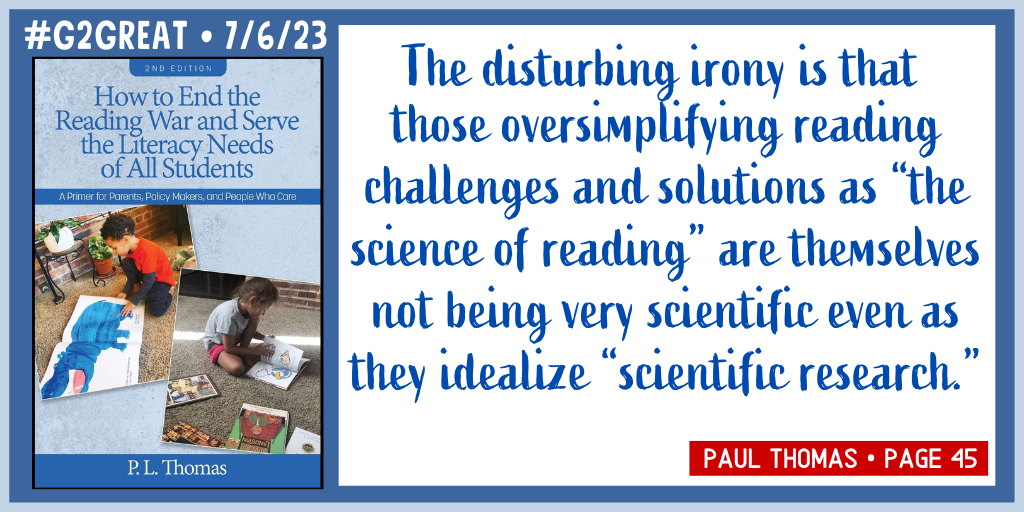
With fingers resting on the keyboard, I reflect on our timely Twitter-style discussion with Paul and ponder the direction of my post on a chat that will long stay with me. I’m suddenly drawn full circle to my deep appreciation for Paul’s tireless efforts to inform and inspire us in challenging times.
My timeline below reflects key events with Paul that have fueled my thinking:
September 10, 2018: Hard Words: Why Aren’t Kids Being Taught to Read (Emily Hanford APM REPORTS). This important early introduction is what Paul refers to as “ground zero” of the Science of Reading Movement.
June 1, 2020: The 1st edition of Paul’s book was published. I am fortunate to be in an online group with Paul, so we had the advantage of a pre-publication read. It was instantly clear that his book was a rich contribution to this discussion.
August 1, 2022: The 2nd edition of Paul’s book was published with essential updates with ‘new developments around the “science of reading,” increasing impact on state policy and legislation, and an expanded research base’. Once again, it was what we needed.
November 21, 2019: I met Paul face-to-face for the first time at the ILA Annual Conference in New Orleans: Misreading the Science of Reading. It was the 1st time any major conference had broached this topic. The sense of desperation for guidance was evident when ILA had to find a larger room and we moved into a standing-room-only space. I shared my after session notes HERE. Looking back, I recall the atmosphere in that space of learning and I knew that this is what HOPE looks in a room where gratitude and relief filled the air.
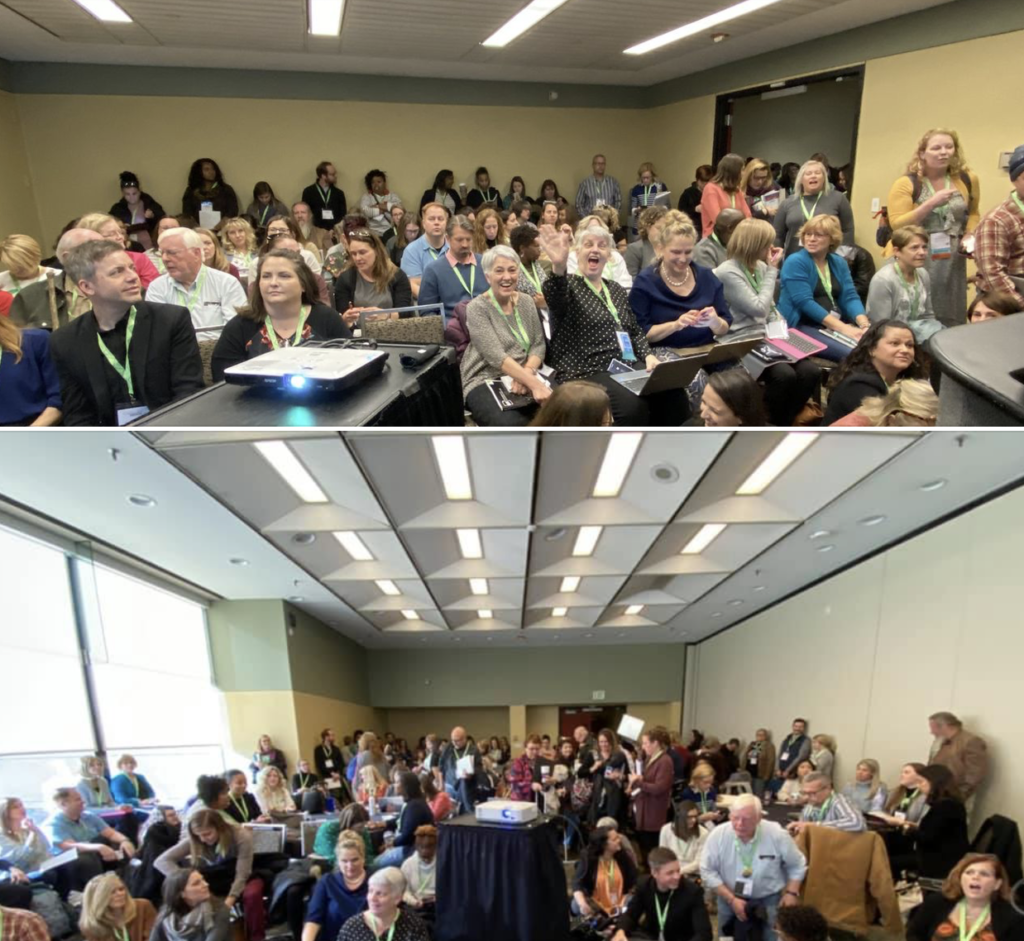
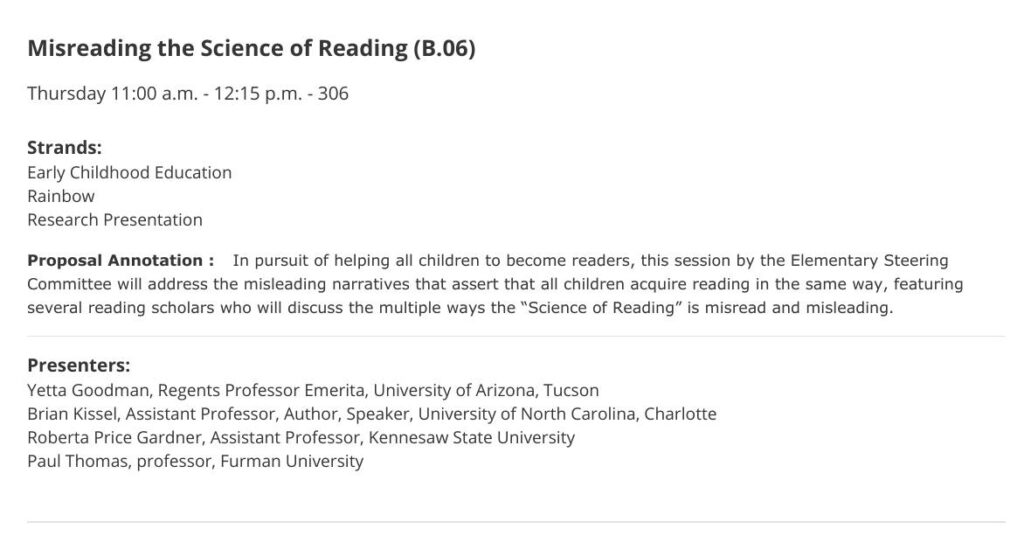
Going back to “ground Zero, here is a quote we shared during the chat;
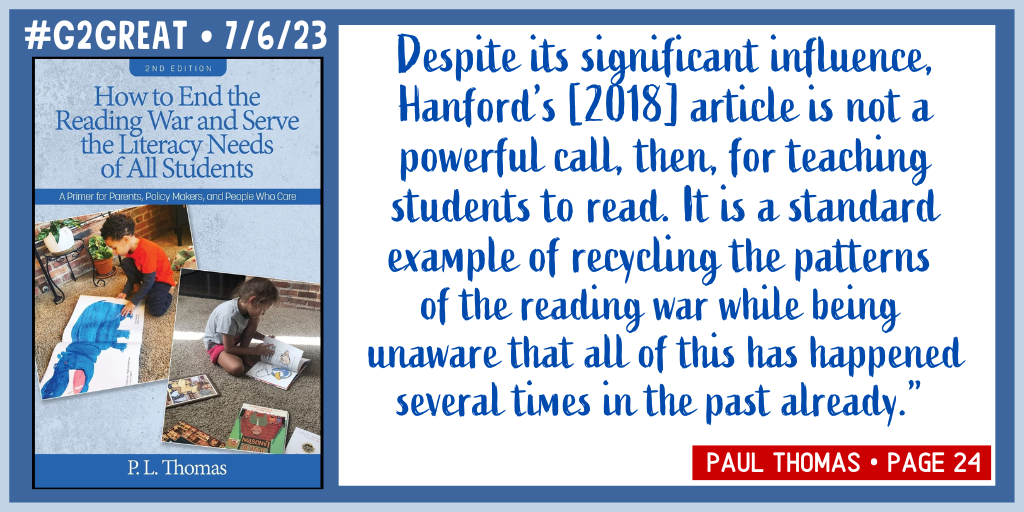
It is my hope that every educator will read How to End the Reading War and Serve the Literacy Needs of All Students (2nd Edition): A Primer for Parents, Policy Makers, and People Who Care (2022, IAP Information Age Publishing) and be a regular reader of Paul’s extensive The Science of Reading blogs at Radical Scholarship.
For additional inspiration, it’s helpful to hear from the author. We asked Paul to share insight on his book including what motivated him to write the book, what impact he hopes it will have and any key takeaways. Here is what Paul said:
After blogging for a couple years, starting in 2018, on the growing SOR movement grounded in the media, specifically the work of Hanford, I realized I had enough material for a book.
The blog posts were important (and still are) but I felt a book would help raise the credibility of the work even though I am primarily concerned about impacting the public and political narratives around education and reading, ultimately seeking ways to curtail really misguided reading policy and legislation.
The grounding of the book, I think, is to put today’s reading “story” in historical context so that we can step away from the crisis/miracle dichotomy found in media and political discourse and ultimately policy.
The book, I hope, can better focus on the realities of the challenges children and teachers face when learning/teaching reading (poverty, inequity, class size, etc.) so that we may find opportunities to recommend complex and different policies and practices that will support students learning and teacher effectiveness.
My work in literacy is at the core of my 40 years as an educator, and I am grounded in Paulo Freire’s belief that literacy is liberatory; it is our work to help children read and re-read the world, to help children write and re-write the world.
In a recent article in The Journal of Reading Recovery: The Science of Reading Era: Seeking the “Science” in Yet Another Anti-Teacher Movement (Spring 2023, Volume 22, No 20, pages 5-18), Paul writes:
“Education crisis, teacher bashing, public school criticism, and school-based culture wars have a very long and tired history, but this version is certainly one of the most intense– likely because of the power of social media. The SOR movement, however, exposes once again that narratives and myths have far more influence in the U.S than data and evidence.” (p. 13)
To extend this influence, I’ll highlight our #G2great chat discussion with Paul to broaden the potential for social media to offer a useful counter narrative to what is all too commonly shared by The Science of Reading. To that end, I’ll spotlight some of the wonderful Twitter messages shared during the chat. (You can revisit our full chat discussion on Wakelet HERE.)
#G2Great Tweet Examples
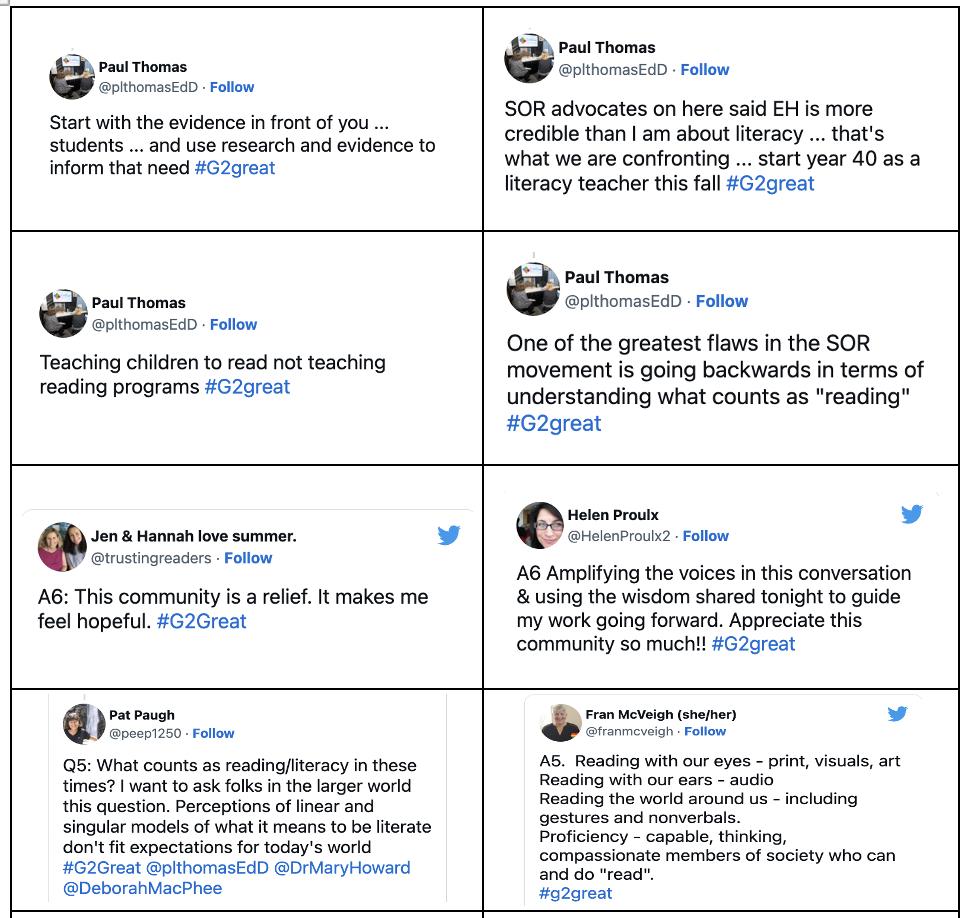
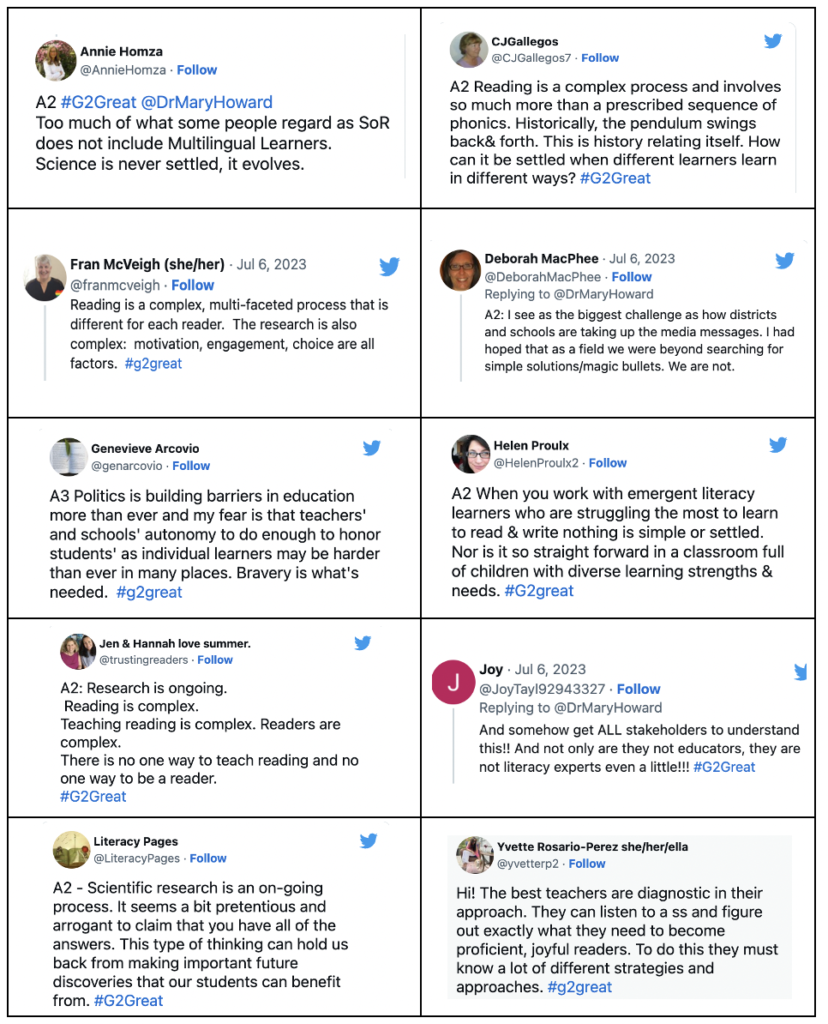
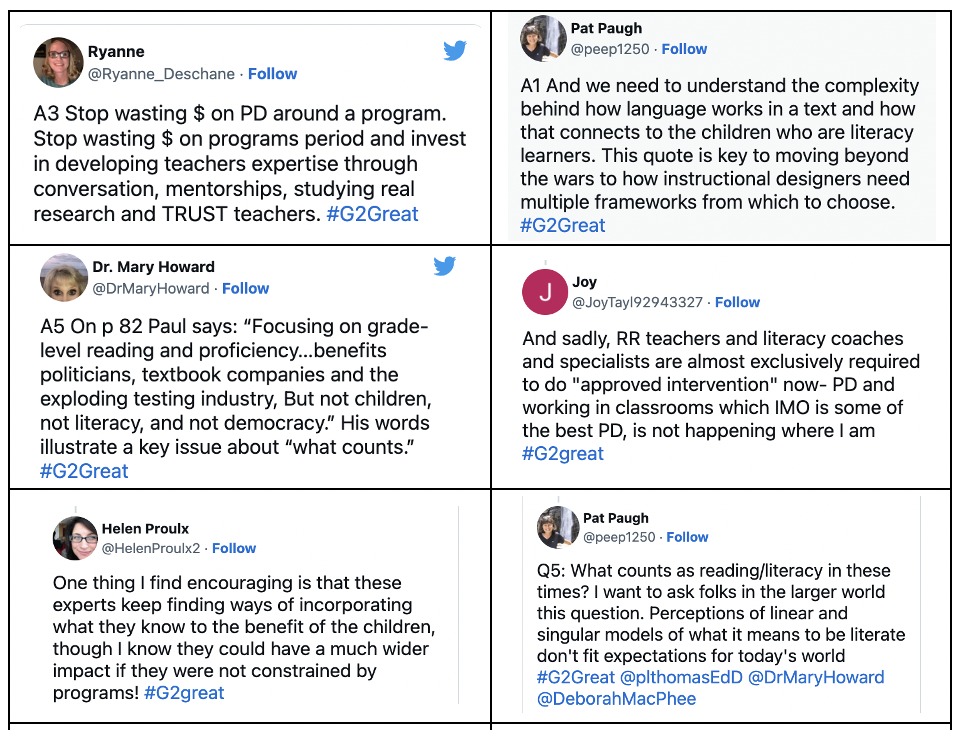
MY FINAL THOUGHTS
In his book under the heading, “The Big Lie About the “Science of Reading” Paul writes
“Social media can also be a powerful window into how we think about and discuss education. The current reading war has been fueled significantly by social media, in fact, empowering parents and advocates for students with dyslexia armed with a compelling refrain, the “science of reading.” In many ways, the reading war fits perfectly into Twitter and Facebook, even though it has its roots many, many decades before either were created. (p. 25)
For too long, social media has taken an alarming dark path into a virtual battleground where speaking up comes with great risk. For many of us, this unfortunate and unexpected shift is now commonplace. As I think about this new digital atmosphere, I’m drawn to the chat tweets below. Just as I felt in that room the day I met Paul Thomas for the first time, our chat discussion with Paul gave us all a sense of hope and we are ready to meet the call and speak up on behalf of this profession, the teachers who work tirelessly to put kids first and above all the children who have always been at the center of our efforts. We can reclaim this space for respectful conversations that are needed. Find an inroad where such dialogue is welcomed while also being hypervigilent to avoid the quicksand of name-calling that too often rises to the surface and walk away.
These tweets below express what many of us are feeling:
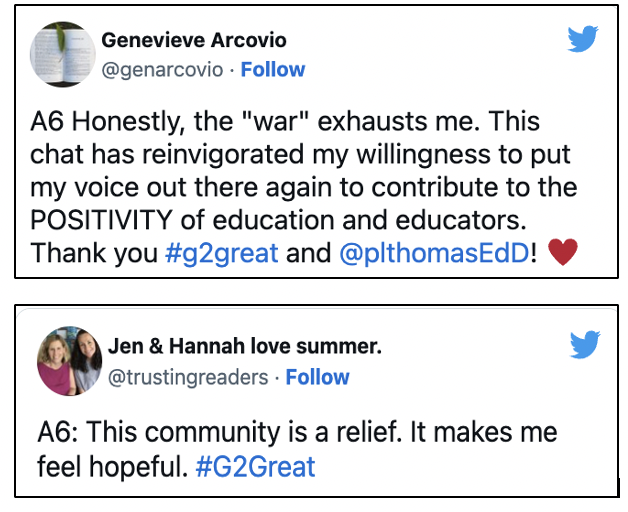
We are grateful to Paul Thomas and so many others who are helping us to face these waves of uncertainty mixed with hope and possibility. Paul’s support will help us maneuver those Twitter Waters with a fresh new outlook.
Don’t be afraid to speak up and share your research-informed beliefs. Because if we don’t, then our voices will be silenced by the noise and chaos hiding in waiting behind unexpected corners.
And when in doubt remember Paul’s words in the heading of his amazing blog…

PAUL THOMAS BIO:
P. L. Thomas, Professor of Education (Furman University, Greenville SC), taught high school English in rural South Carolina before moving to teacher education. He is a former column editor for English Journal (National Council of Teachers of English) and author of Teaching Writing as Journey, Not Destination: Essays Exploring What ‘Teaching Writing’ Means (IAP, 2019) and How to End the Reading War and Serve the Literacy Needs of All Students: A Primer for Parents, Policy Makers, and People Who Care 2nd ed. (IAP, 2022). NCTE named Thomas the 2013 George Orwell Award winner. He co-edited the award-winning (Divergent Book Award for Excellence in 21st Century Literacies Research) volume Critical Media Literacy and Fake News in Post-Truth America (Brill, 2018). Follow his work @plthomasEdD and his blog (http://radicalscholarship.wordpress.com/).
PAUL THOMAS REFERENCES
Teachers Are Leaders (Podcast): Dr. Paul Thomas on the Multiverse that is the Science of Teaching Reading, June 2023 Schoolutions podcast, December 20, 2022 (recording); January 9, 2023 (release): S2 E18: How to End the Reading War: A Critical Conversation with Dr. P. L. Thomas